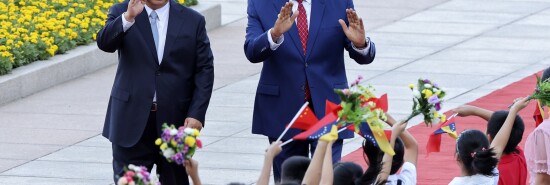
China sends US message with Venezuela strategic partnership
Tom Rogan
Video Embed
Throwing out the red carpet for Venezuelan leader Nicolas Maduro, Xi Jinping sent a clear message to the United States this week. The message is that as Washington bolsters its relations with Pacific nations, a la its strategic partnership with Vietnam, Beijing will bolster its U.S.-hostile relationships in the Western Hemisphere.
Maduro and Xi’s meetings produced more than pictures of flag-waving children. In a joint statement, China and Venezuela observed that “taking into account the profound changes in the current international and regional situation, the two sides unanimously decided to upgrade China-Venezuela relations to an all-weather strategic partnership.” Laden with Beijing’s preferred wording (something Beijing often insists upon), the communique explained that these “good comrades-in-arms for strategic cooperation” would “strengthen strategic coordination on international affairs.”
HOW KIM JONG UN’S RUSSIA TRIP ILLUSTRATES HIS SECURITY PARANOIA
Some other points of note:
“The two sides will continue to promote and deepen cooperation in the fields of energy, finance, economy and trade, investment, mining, agriculture, infrastructure, communications, digital economy and other fields.” The vague “other fields” point will refer to security, military, and intelligence cooperation. Bolstering Maduro’s once deeply strained hold on power, China has already provided him with sensitive military and signals intelligence collection systems. “Work together to jointly promote the progress of cooperation projects in the fields of communications and remote sensing satellites, lunar and deep space exploration, and promote aerospace cooperation between the two countries.” This activity will bear crossover benefits in terms of espionage cooperation via imagery and signals intelligence collection. As with its listening station in Cuba, Venezuela offers Beijing new means of exerting influence in the Americas.
There’s an ideological impetus to this partnership. Supporting Xi’s effort to establish a new international order beyond Washington’s influence, Xi and Maduro explained that they “oppose all forms of hegemonism and power politics, all forms of unilateralism, and the formation of camps and exclusive small circles targeting specific countries.” Beijing and Caracas will instead “consolidate a multi-center, multi-polar world and work together to build a community with a shared future for mankind.”
Top line: China might be suffering diplomatic setbacks with democracies, but its relations with and influence over other autocracies are only growing closer.
